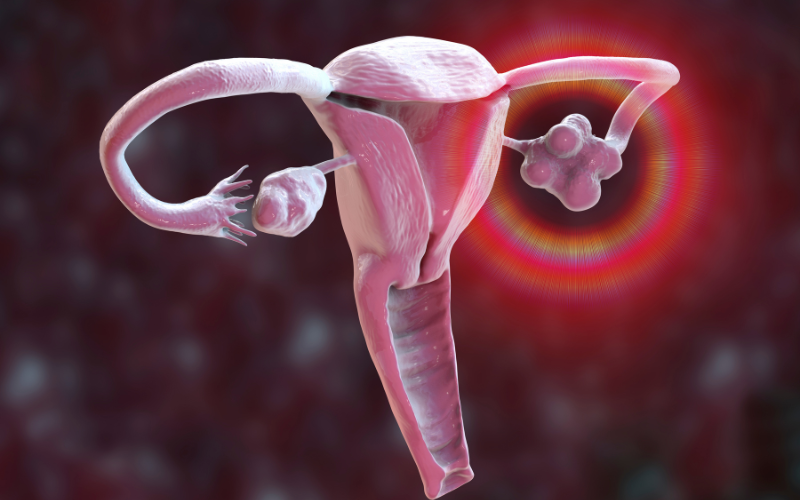Author: Dr. Shruti N Mane
Qualification: M.B.B.S, M.S (OBG), PG Diploma in ART AND Reproductive MedicineOvarian cysts are small sacs in the ovaries, filled with fluid. They are the size of a cherry. It is commonly seen in women of child bearing age group and does not cause any serious symptoms.
The ovarian cysts form as a result of hormonal changes in a woman’s body. Puberty and menopause often presents with hormonal fluctuations. It is normal and the variation in hormones lead to development of ovarian cysts. In rare cases the cysts are present when a child is born.
The cysts are very common in women. An estimate shows that 10 in 100 women have ovarian cysts. The cyst is not cancerous and does not require any treatment. In certain rare situations, some ovarian cyst may need a surgical removal.
This blog will walk you through the ovarian cysts causes, symptoms, and treatment. And give insights on when to see a doctor.
What Are the Symptoms of Ovarian Cysts?
Most women with ovarian cysts do not show any symptoms. In fact most of them don’t know they have an ovarian cyst. However, if the cyst ruptures, or is too big, it may present with symptoms. Some of the most common ovarian cyst symptoms are:
- Pain in the pelvic region or lower abdomen. The pelvic pain is usually felt as a heavy sensation or dull in nature. Sometimes the pain is sudden, sharp, and severe.
- Some women present with irregular menstrual cycles. It includes abnormal vaginal bleeding and spotting between periods.
- When the cysts are large it pushes the bladder and bowel. It can lead to a feeling of fullness and difficulty to pass stool.
- When a cyst bursts, a sudden, sharp pain occurs.
- Sometimes large cysts can twist the ovary. It will cause severe cramps, nausea, vomiting, and an increase in pulse rate.
6. Difficulty to urinate and pelvic pain while urinating.
What Are the Causes of Ovarian Cysts?
Ovarian cysts mostly occur naturally. Some may develop as a result of certain diseases as well. They are of two main types:
- Functional Ovarian Cysts:
The cysts develop during different phases of the menstrual cycle. It occurs due to hormonal fluctuations. The functional ovarian cysts are most commonly seen during puberty or menopause.
Eg: Follicular cyst. Corpus luteum cyst, and theca lutein cyst.
- Pathological Ovarian cysts:
Pathological ovarian cysts develop as a result of uncontrolled cell growth. It can also occur as a result of endometriosis or polycystic ovary syndrome.
Eg: Chocolate cyst (endometriomas), dermoid cyst, and cysts in PCOS.
How to Diagnose an Ovarian Cyst?
The ovarian cysts are asymptomatic. If you experience sudden sharp pelvic pain, or have symptoms of nausea and vomiting, you must visit a doctor. The symptoms are not always ovarian cysts. Conditions like pelvic inflammatory disease and ovarian cancer also cause similar symptoms.
Ovarian cysts are visible in an ultrasound. Sometimes they are palpable too. A doctor may discover an ovarian cyst in a routine ultrasound of the ovaries.
The cysts are non-cancerous. However, to rule out any possibilities, the doctor may suggest additional blood tests.
How to Treat an Ovarian Cyst?
The ovarian cysts cause mild symptoms or no symptoms. A physician will suggest that you wait and observe. Most of the cysts go away without treatment. If an ultrasound detects an ovarian cyst, it is advisable to go for regular checkups. It will ensure the cysts are not undergoing any changes.
A doctor will prescribe painkillers or NSAIDs (non-steroidal anti-inflammatory drugs) to relieve severe pain. The ovarian cysts treatment depends on its size, number, and symptoms.
A gynaecologist may perform a laparoscopy surgery to remove the cysts if it does not shrink overtime or show signs of growth. Tiny cuts are made on the stomach and the instrument is put inside the ovaries to view or remove the cysts.
The gynaecologist will perform a surgery to remove the ovaries when the cysts are cancerous. In some cases removal of both the ovaries can significantly impact women of child bearing age. It will lead to menopause and the woman cannot become pregnant. Additionally, it will result in symptoms like, night sweats, hot flashes, mood swings, and headaches.
Some doctors will recommend birth control pills. It reduces the hormones in the ovaries and stops ovulation. However, the pills will not treat the cysts completely.
Will Ovarian Cyst Make a Woman Infertile?
Ovarian cysts will not make a woman infertile. However, women with cysts may find it difficult to get pregnant. The surgeon will save the ovaries when performing a surgery to remove the cysts. They may either remove the cysts alone, or only one ovary.
Women who are undergoing surgery for ovarian cysts must talk to their surgeon regarding the effects on their fertility. If you want to know more about ovarian cysts or other gynaecological issues you can consult an expert at Motherhood Fertility & IVF Center.
happiness with India’s
Trusted Fertility Chain
Need help? Talk to our fertility experts.
Had an IVF Failure? Take a Second Opinion.



